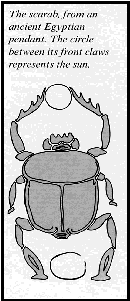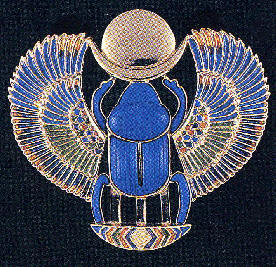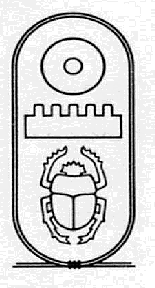Scarabs – The Magical Beetle of Egypt
| By: Carl Teichrib; ©2002 |
| In the recent hit movie The Mummy, and its sequel, The Mummy Returns, strange black beetles known as scarabs were frequently encountered. In reality, scarabs are nothing more than the common African dung beetle, but Egyptian religious beliefs have given them several occult meanings. Carl Teichrib explains. |
- Symbols possess an esoteric language, a secret code, which the [occult] student must decipher and whose meaning he or she must unlock.— Erwin W. E. Watermeyer, “Symbols: The Tools of Initiation,” Rosicrucian Digest, March 1985.
- The crucial question, of course, is what kind of meaning is being conferred by the use of certain symbols – what stands to be gained, what lost, and by whom. — Baigent, Leigh, and Lincoln, The Messianic Legacy, p.136.
Throughout the ages, certain symbols have been employed to communicate hidden mystical messages. For practitioners of the occult, these symbols are tools specifically used in conjuring and wielding supernatural powers, and in communicating their secret doctrines. And while these symbols are often many centuries old, their meanings have remained essentially the same. In fact, as the public extension of ancient occult teachings, the New Age movement has placed mystical symbolism squarely in the face of our modern culture. What makes this especially disturbing is that while the “marks” of occultism can be found throughout society, we no longer recognize their spiritual implications. Conversely, just because the average person doesn’t know the meaning of occult symbols, it in no way negates their significance. Manly P. Hall, one of the most influential occultist of the last century, wrote this of symbols, “They are centers of a mighty force, figures pregnant with an awful power…” (Lectures on Ancient Philosophy, p.356)
Contents
The Scarab Beetle
In the recent hit movie The Mummy, and its sequel, The Mummy Returns, strange black beetles known as scarabs were frequently encountered throughout the script. Both movies portrayed these scarabs as terrifying flesh-eating supernatural-type insects. In reality, scarabs are nothing more than the common African dung beetle. Although Hollywood embellished these creatures, both movies rightly associated scarabs as an important part of Egyptian religious and ceremonial rites.

A fascinating part of God’s wonderful creation, dung beetles roll balls of animal dung along the ground. These balls are rolled into holes, whereupon the beetle deposits its larvae which, being hatched, feed upon the dung. According to Egyptian doctrine, the dung beetle rolling his ball was considered illustrative of the Sun’s heavenly circuit and its daily self-renewal. Hence, a symbolical scarab carrying a Solar disk upon its back represented the Sun’s cycle through the sky.
Scarabs were also symbolic of resurrection. This too was directly linked with the rising of the Sun. In fact, since the scarab was spiritually connected with the Sun-rise, it became closely associated with the Egyptian deity Khepri–“god of the rising Sun.” In every aspect, scarabs and Egyptian Solar worship were inseparable.
During the time of the Egyptians, stone-carved scarabs were used as magical amulets, supposedly aiding its wearer with the power of “eternal renewal of life.” Scarabs were also employed as talismans and royal seals. The winged scarab (as illustrated below) was used in funeral rites. Rodman Clayson, author of Egypt’s Ancient Heritage–published by AMORC–wrote,
- So-called heart scarabs, usually flanked with falcon’s wings, were funerary talismans. The heart scarab [made] of stone was laid upon the breast of the mummy, and this indicated that the guilty soul must stand in the judgment hall in the presence of Osiris. The scarab thus used was to secure exemption from the possible performance of an evil life.
AMORC–the Ancient Mystical Order Rosae Crucis–is a Rosicrucian society headquartered in San Jose, California. As a society based on many Egyptian mystical and esoteric teachings, AMORC generously employs the scarab symbol throughout much of their literature and ritual work. The two scarabs illustrated below are taken from AMORC sources.


Sir Wallis Budge, late keeper of Egyptian and Assyrian antiquities within the British Museum, gave a similar explanation in his important work titled Egyptian Magic, “…the scarab or beetle itself possesses remarkable powers, and if a figure of the scarab be made, and the proper words of power be written upon it, not only protection of the dead physical heart, but also new life and existence will be given to him to whose body it is attached.”
The world of Egyptian magic has long been embraced by secret esoteric societies, including Rosicrucian orders, Freemasonry, Theosophy, and the Golden Dawn. However, placing one’s hope of a beneficial afterlife in the occult symbol of the Egyptian scarab–or in any of the ways or doctrines of Egyptian magic– is a spiritually bankrupt approach. The Bible, a historically and spiritually reliable record of God’s instruction to mankind, makes it very clear that He cannot accommodate this type of idolatrous spiritual activity. Furthermore, the Bible explicitly states that Jesus Christ is the only way to all truth and life (John 14:6).
God is holy and just–He cannot accept sin, yet he provides a way for sinful man to come to Him. Turn to Jesus Christ in repentance. It is only through His finished work on the cross–and not through occult practices or doctrine–that salvation can be secured.
Carl Teichrib is a Canadian based researcher and writer on globalization and the occult. His work has been used by such authors as Gary Kah and Berit Kjos, among others. Carl may be reached by emailing: [email protected].








[…] Read Part 11 […]
If someone receives gift that has scarab what should they do? Some people want to discover the meaning so they study about it and still don’t understand
[…] The Magical Beetle of Egypt By: Carl Teichrib […]